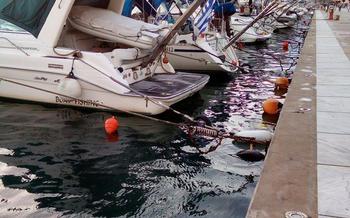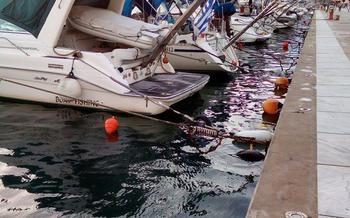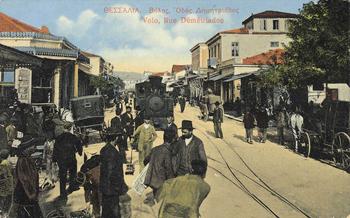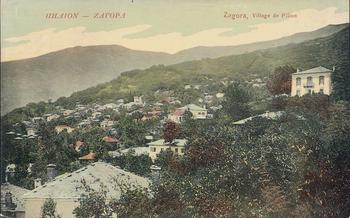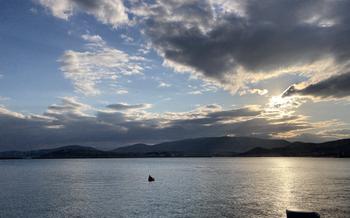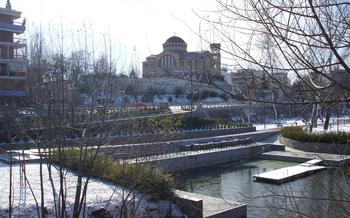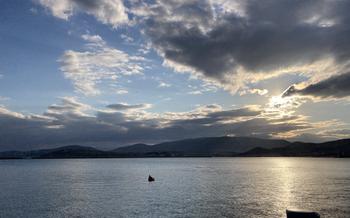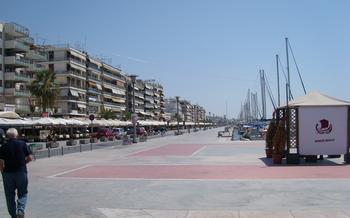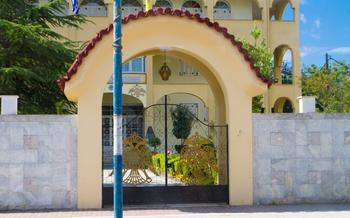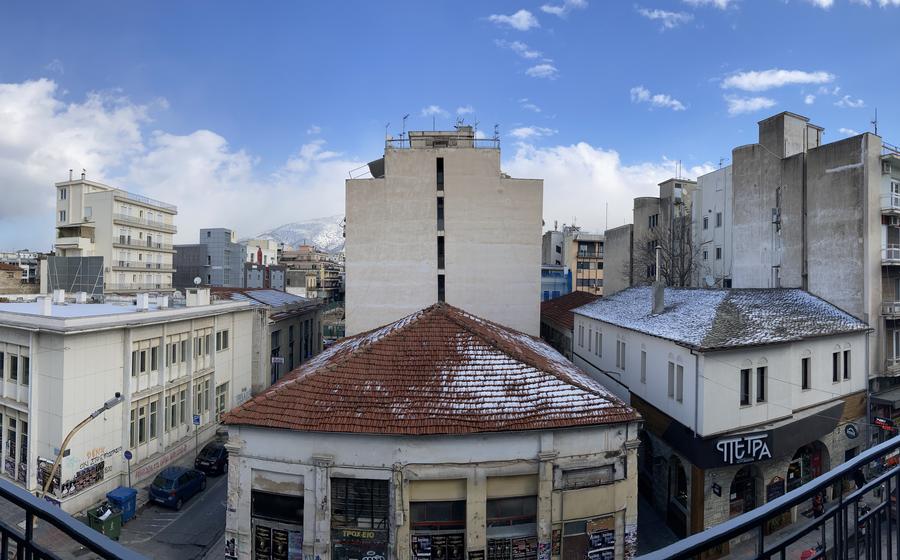
Mount Pelion
- Volos: Gateway to Mount Pelion
- The Enchanting Villages of Mount Pelion
- Natural Wonders of Mount Pelion
- Historical and Cultural Heritage
- Gastronomic Delights of Mount Pelion
- Outdoor Activities and Adventures
- Beaches and Coastal Gems
- Religious and Spiritual Sites
- Art and Crafts of Mount Pelion
- Events and Festivals
- Family-Friendly Attractions
- Off-the-Beaten-Path Gems
- Sustainable Tourism Practices
- Budget Tips for Travelers
- Insider Tips for an Unforgettable Experience
Volos: Gateway to Mount Pelion
Volos, a vibrant port city nestled between the Aegean Sea and Mount Pelion, offers a captivating blend of history, culture, and natural beauty. Founded by the Mycenaeans in the 13th century BC, Volos played a pivotal role in ancient Greek mythology as the home of the Argonauts, who embarked on their epic quest for the Golden Fleece. Today, Volos serves as the gateway to the enchanting Mount Pelion, a mountainous peninsula renowned for its picturesque villages, lush forests, and stunning coastline.
With its strategic location, Volos offers seamless connectivity to Mount Pelion and beyond. From major cities like Athens and Thessaloniki, travelers can easily reach Volos by car, bus, or train. Frequent ferry services connect Volos to the Sporades Islands, inviting visitors to explore the unspoiled beauty of Skiathos, Skopelos, and Alonnisos.
Volos itself boasts a diverse range of accommodation options, catering to every budget and preference. From charming guesthouses and cozy apartments to upscale hotels with panoramic views, visitors can find the perfect base for their Mount Pelion adventure. Whether seeking a romantic getaway, a family vacation, or an adventurous escape, Volos is the ideal starting point for an unforgettable journey into the heart of Mount Pelion.
The Enchanting Villages of Mount Pelion
Mount Pelion is home to a collection of picturesque villages, each with its unique charm and character. Makrinitsa, perched on a hillside overlooking the Pagasetic Gulf, is renowned for its stunning views, traditional stone houses, and cobblestone streets. Portaria, known as the "balcony of Pelion," offers panoramic vistas of the surrounding mountains and coastline. Milies, with its lush vegetation and flowing waters, is a haven for nature lovers and hikers.
These villages are a testament to Pelion's rich architectural heritage, showcasing traditional stone mansions, wooden balconies, and intricate carvings. Visitors can wander through the narrow alleys, admiring the well-preserved houses and churches that reflect the region's history and culture.
Beyond their architectural beauty, these villages offer a glimpse into the local traditions and customs of Mount Pelion. Visitors can witness traditional festivals and celebrations, such as the Pelion Folklore Festival in August, where locals showcase their music, dance, and culinary delights.
Village hopping is a popular activity, allowing visitors to experience the diverse character of each community. The villages are well-connected by a network of roads and trails, making it easy to explore at your own pace. Whether by car, on foot, or by bicycle, the journey between villages offers breathtaking views of the surrounding landscapes.
Natural Wonders of Mount Pelion
Mount Pelion is a haven for nature enthusiasts, boasting breathtaking landscapes, lush forests, crystal-clear rivers, and panoramic views that will leave you in awe. The region offers a diverse range of natural attractions, catering to every preference and fitness level.
For those who love hiking, Mount Pelion is a paradise. There are trails for all levels, from leisurely walks through the forest to challenging treks to the summit of Mount Pelion, the highest peak in the region. The E4 European Long Distance Path, a legendary hiking route that traverses 11 countries, also passes through Mount Pelion, offering hikers the opportunity to explore its diverse terrain and stunning scenery.
The region is also a haven for wildlife enthusiasts. The forests are home to a variety of animals, including deer, wild boar, and foxes, while the rivers and streams are teeming with trout and other fish. Birdwatchers will be delighted by the abundance of birdlife, including eagles, hawks, and owls.
For those who prefer to explore the natural beauty of Mount Pelion on wheels, there are scenic drives that wind through picturesque landscapes, offering breathtaking views at every turn. Whether you're cruising along the coast, traversing the mountain passes, or meandering through the charming villages, you'll be treated to a visual feast.
Historical and Cultural Heritage
Mount Pelion is a treasure trove of historical and cultural heritage. The region is dotted with ancient ruins, monasteries, and traditional stone bridges that speak to its rich past. One of the most significant historical sites is the ancient city of Demetrias, founded in the 3rd century BC. Visitors can explore the ruins of the city walls, theater, and agora, which offer a glimpse into the city's once-thriving civilization.
Mount Pelion also boasts several historic monasteries, perched on mountain slopes and offering breathtaking views. The Holy Monastery of Saint John the Baptist, founded in the 11th century, is one of the most important religious sites in the region. Visitors can admire the monastery's impressive architecture, its collection of Byzantine icons, and its stunning views of the Aegean Sea.
The Church of the Transfiguration in Makrinitsa is another architectural gem. Built in the 18th century, the church features intricate frescoes and a beautiful bell tower that dominates the village's skyline.
Mount Pelion played a significant role during the Greek Revolution in the 19th century. The region was a stronghold of the Greek rebels, and several battles were fought in the area. Visitors can learn more about this period of history at the Pelion Folklore Museum in Milies, which houses a collection of artifacts and documents related to the revolution.
The region is also rich in local legends, myths, and folklore. One of the most famous legends is the story of the Centaurs, mythical creatures half-human, half-horse, said to have inhabited Mount Pelion. Visitors can follow the Centaurs' Path, a hiking trail that leads through the forest to the Centaurs' Cave, where they are said to have lived.
Gastronomic Delights of Mount Pelion
Mount Pelion is a culinary haven, offering a diverse range of traditional Greek dishes that showcase the region's fresh, local ingredients. Pelion cuisine is influenced by its unique geography, with dishes that combine mountain and coastal flavors. Must-try delicacies include spoon sweets, a variety of preserved fruits in syrup, and pies, filled with savory or sweet ingredients. Grilled meats, especially lamb and goat, are a staple, often seasoned with aromatic herbs from the mountain slopes.
For an authentic Pelion experience, visit family-run tavernas and restaurants. These cozy establishments offer a warm ambiance and a chance to savor traditional flavors. Many tavernas have outdoor seating with stunning views of the surrounding mountains and sea.
If you're a culinary enthusiast, consider taking a cooking class or food tour. Learn the secrets of Pelion cuisine from local experts and discover the stories behind the dishes. You'll not only enjoy a delicious meal but also gain insights into the region's rich culinary traditions.
Outdoor Activities and Adventures
Mount Pelion beckons outdoor enthusiasts with its diverse landscapes and array of activities.
Hikers of all levels will delight in the extensive network of trails that wind through forests, along rivers, and to panoramic viewpoints. The E4 European Long Distance Path, a legendary trail that traverses eleven countries, offers a challenging yet rewarding trek through the heart of Pelion.
Mountain bikers will find adrenaline-pumping trails that traverse rugged terrain, offering breathtaking views and technical challenges. Horseback riding enthusiasts can explore the region's scenic trails on horseback, immersing themselves in the natural beauty of Mount Pelion.
For those seeking aquatic adventures, the crystal-clear rivers and the Aegean Sea offer a variety of water sports. Canoeists and kayakers can navigate the pristine waters, while paddleboarders can glide across the tranquil surfaces of lakes and rivers.
During the winter months, the Agriolefkes Ski Center, located on the slopes of Mount Pelion, offers skiers and snowboarders a chance to hit the slopes and enjoy the thrill of winter sports amidst breathtaking mountain scenery.
Organized tours and activities are available for adventure seekers who prefer a guided experience. These tours cater to various interests, from leisurely walks to challenging hikes, ensuring that visitors can make the most of Mount Pelion's outdoor offerings.
Beaches and Coastal Gems
The Pelion coastline is a treasure trove of hidden coves, sandy beaches, and picturesque bays, inviting visitors to bask in the Mediterranean sun and indulge in refreshing dips in the crystal-clear waters. Whether you seek seclusion or vibrant beach life, Mount Pelion offers a diverse range of coastal experiences.
Discover hidden coves accessible only by foot or boat, where you can enjoy tranquil moments surrounded by nature's beauty. For a more lively atmosphere, head to organized beaches equipped with sunbeds, umbrellas, and water sports facilities. Indulge in swimming, sunbathing, snorkeling, or embark on a kayaking or paddleboarding adventure to explore the coastline from a different perspective.
After a day of beach bliss, savor delicious seafood and traditional Greek cuisine at charming tavernas and cafes lining the coast. Sip on a refreshing drink as you relish the breathtaking views of the sparkling sea and the lush mountains in the distance.
Enhance your coastal experience with a boat trip or excursion to nearby islands, offering unique perspectives and hidden gems. Explore the marine life and secluded beaches of the Northern Sporades islands, including Skiathos, Skopelos, and Alonissos.
Remember to respect the natural beauty of the beaches and coastal areas by avoiding littering and using eco-friendly sunscreen to protect the delicate marine ecosystem.
Religious and Spiritual Sites
Mount Pelion is home to several historic monasteries and churches that hold religious and spiritual significance. These sites offer a glimpse into the region's rich religious heritage and provide opportunities for pilgrimage and spiritual reflection.
Among the most notable monasteries is the Holy Monastery of Saint John the Baptist, located near the village of Portaria. Perched on a mountain slope overlooking the Pagasetic Gulf, this 16th-century monastery offers stunning views and a serene atmosphere. Visitors can explore the monastery's beautiful frescoes, learn about its history, and attend religious services.
Another important religious site is the Church of the Transfiguration in Makrinitsa. Built in the 18th century, this church is known for its exquisite Byzantine-style architecture and its impressive collection of icons. The church offers regular services and is a popular destination for pilgrims and tourists alike.
Mount Pelion's religious sites are not only places of worship but also cultural treasures that reflect the region's deep-rooted spiritual traditions. Visitors are encouraged to visit these sites with respect and reverence, and to take the opportunity to learn about the rich religious history of the region.
Art and Crafts of Mount Pelion
Mount Pelion is a haven for art enthusiasts, with a thriving community of local artisans creating unique and beautiful pieces using traditional techniques. Pottery, textiles, and woodwork are among the most popular crafts, with artisans using locally sourced materials to create one-of-a-kind pieces that reflect the region's rich cultural heritage.
Visitors can explore traditional crafts workshops and witness the artisans at work, learning about the techniques and processes involved in creating these beautiful objects. Art galleries showcase the works of both local and international artists, providing a platform for emerging talent and showcasing the diverse artistic expressions of the region.
Shopping for souvenirs and handmade gifts is a delight in Mount Pelion, with a wide range of unique and authentic items to choose from. Whether you're looking for a piece of pottery to remind you of your trip, a handwoven textile to add a touch of warmth to your home, or a piece of woodwork that showcases the region's craftsmanship, you're sure to find something special to take home.
Some of the most popular items to look out for include hand-painted ceramics, colorful woven rugs, intricately carved wooden sculptures, and delicate jewelry made with local materials. These handmade treasures not only make for beautiful souvenirs but also support the local artisans and help preserve the region's traditional crafts.
Events and Festivals
Mount Pelion comes alive during its numerous cultural events, music festivals, and traditional celebrations that showcase the region's rich heritage and vibrant spirit. The Pelion Folklore Festival, held in August, is a highlight, featuring traditional dances, music, and costumes. In October, the Apple Festival in Zagora celebrates the region's renowned apple orchards, with tastings, cooking demonstrations, and live music. For mushroom enthusiasts, the Mushroom Festival in Tsagarada in November offers a unique opportunity to learn about and sample the region's diverse mushroom varieties. These events provide a glimpse into the local culture and create a festive atmosphere that attracts visitors from near and far.
Family-Friendly Attractions
Mount Pelion is a great destination for families with children of all ages. There are a number of theme parks and playgrounds scattered throughout the region, as well as kid-friendly activities like horseback riding, swimming, and fishing.
Many of the beaches in Pelion are also family-friendly, with shallow waters and soft sand. And, for those looking for a more educational experience, there are a number of museums and workshops that offer programs and activities for children.
Additionally, there are a number of family-oriented festivals and events held throughout the year, such as the Pelion Folklore Festival in August and the Apple Festival in Zagora in October.
With its beautiful scenery, mild climate, and abundance of family-friendly activities, Mount Pelion is an ideal destination for a memorable family vacation.
Off-the-Beaten-Path Gems
Beyond the popular villages and attractions, Mount Pelion offers a treasure trove of hidden gems waiting to be discovered. Venture off the beaten path to find secluded waterfalls, pristine beaches, and charming villages untouched by mass tourism.
One such hidden gem is the Centaurs' Path, a mystical trail said to have been frequented by the mythical creatures of Greek mythology. Hike along this ancient path, surrounded by lush forests and stunning views, and let your imagination run wild.
Another off-the-beaten-path attraction is the Pelion Folklore Museum in Milies. This charming museum showcases the region's rich cultural heritage through exhibits of traditional costumes, tools, and household items. Step back in time as you learn about the customs and traditions of the Pelion people.
Don't miss the opportunity to explore the Old Town of Volos, a hidden gem in its own right. Wander through its narrow cobblestone streets, admire the neoclassical architecture, and visit the Archaeological Museum of Volos to learn about the region's ancient history.
These off-the-beaten-path gems offer a unique perspective on Mount Pelion's diverse landscapes and rich cultural heritage. Embrace the spirit of exploration and discover the hidden treasures that await.
Sustainable Tourism Practices
Mount Pelion is committed to preserving its natural and cultural heritage through sustainable tourism practices. Many eco-friendly accommodation options are available, from traditional guesthouses using renewable energy sources to hotels with green certifications. When hiking or camping, follow responsible guidelines to minimize your impact on the environment, such as staying on designated trails, packing out your trash, and respecting wildlife. Support local businesses and products to contribute to the local economy and preserve traditional practices. Initiatives for waste reduction and conservation are in place, including recycling programs and efforts to protect endangered species. By embracing sustainable tourism, visitors can help ensure that Mount Pelion's beauty and unique character are preserved for future generations.
Budget Tips for Travelers
Exploring Mount Pelion on a budget is entirely feasible with a bit of planning and resourcefulness. Start by choosing affordable accommodation options like hostels, guesthouses, or budget-friendly hotels. Take advantage of local markets and supermarkets to stock up on groceries and snacks, which can save you money on dining out. Numerous free activities await you, such as hiking, swimming, and sightseeing, allowing you to immerse yourself in the region's natural beauty without spending a dime. Consider using public transportation or renting a bicycle to save on transportation costs. Look for organized tours and activities that offer good value for money, and don't hesitate to ask for discounts or special offers. Embrace the local culture by dining at family-run tavernas, which often provide delicious and budget-friendly meals. With a little creativity and flexibility, you can easily enjoy all that Mount Pelion offers without breaking the bank.
Insider Tips for an Unforgettable Experience
Secret Spots for Breathtaking Views: - For a stunning panoramic vista, hike to the top of Mount Pelion and witness the mesmerizing sunrise over the Aegean Sea. - Discover the hidden gem of Mylopotamos Beach, a secluded paradise with crystal-clear waters and breathtaking sunsets.
Local Customs and Etiquette: - Remember to greet locals with a warm "kalimera" (good morning) or "kalispera" (good evening). - Respect the local traditions and customs, such as attending a traditional Greek Orthodox church service or participating in a village festival.
Best Time to Visit: - For ideal weather conditions and fewer crowds, plan your trip during the shoulder seasons (May-June and September-October) when the temperatures are pleasant, and the landscapes are still vibrant.
